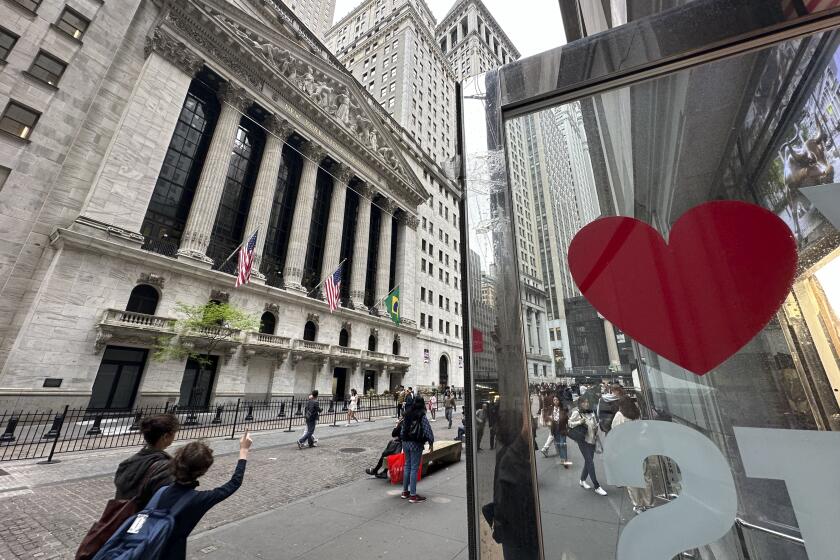2 Top Regulators Fault Wall Street for Poor Job of Self-Policing
Two of Wall Street’s top regulators complained Thursday that securities firms have done an inadequate job of unearthing illegal conduct by their employees or customers and reporting it to authorities.
Some firms have also failed to fully cooperate with government investigations, said Gary G. Lynch, enforcement chief of the Securities and Exchange Commission, and U.S. Atty. Rudolph W. Giuliani of New York.
“The record of cooperation is a very mixed one,” said Giuliani. “In some instances, it has been tremendous. In others, it has been adequate--if we find a problem, they will cooperate in the nature of damage control. In still others, it has been disgraceful and close to obstruction of justice.”
Giuliani and Lynch made their remarks in separate keynote addresses to a gathering at this Florida resort of more than 600 in-house and outside lawyers for securities firms. Neither regulator was particularly conciliatory toward the industry, which has been rocked by nearly weekly exposures of insider traders and other alleged criminals.
Both criticized the level of ethics in the securities industry and suggested that the wrongdoing now being exposed was partly the result of the failure of the firms’ internal regulation, known as “compliance.” Lynch suggested that this may be because some firms have not adequately financed these operations.
“Some firms simply are not supporting their legal and compliance groups in the way they should be,” he said.
Giuliani and Lynch both indicated that they expect securities firms to step forward with evidence of potential crimes, even when they may not be legally bound to do so.
“If you have a customer appearing to engage in illegal conduct,” said Lynch, “it is not enough to simply ask him to move his account to another firm or to knock it off. A responsible firm will notify the SEC or the stock exchange.” He emphasized that firms may not have to do so out of a legal duty but should “because they are good citizens.”
The SEC’s insider trading investigation of stock speculator Ivan F. Boesky, he noted, began with just such a voluntary referral by Merrill Lynch of an anonymous letter it received from a customer. The letter led probers to Dennis B. Levine, an investment banker who then implicated Boesky.
“If Merrill Lynch had not brought that letter to our attention,” he said, “there is a good chance we might not have discovered the problems that led to this area.”
Lynch also complained that many firms on Wall Street still hamper government investigations by not responding promptly to SEC requests for internal documents. Among other things, the SEC must often wait for weeks or months for firms to respond to its demands for so-called “blue sheets,” the internal records of securities trading that are the starting points of many important investigations. The delays often allow wrongdoers to escape prosecution or to ship their illicit gains out of the country.
Giuliani, asked after his own speech to specify the differences between firms in cooperating with the government, described how he approached two large Wall Street firms for assistance while investigating the so-called “pizza connection” case. The probe, which resulted in convictions last year, involved allegations that organized crime was selling narcotics through a network of neighborhood pizzerias.
“We had evidence that some of these drug funds were laundered through accounts at Merrill Lynch and E. F. Hutton,” Giuliani said, “and we asked both firms to make their account information available to us without alerting the specific clients. Merrill Lynch cooperated, but Hutton notified the clients.” He said Hutton did not break the law in doing so, however.
In his talk, Lynch said the SEC will be actively pursuing investigations of wrongdoing other than simple insider trading. This trend is exemplified by last month’s case against Boyd L. Jefferies, a leading institutional stockbroker who was charged with manipulating a stock subject to a public offering and with helping Boesky disguise his ownership of blocks of takeover-prone stocks. The Jefferies case grew out of the insider trading probe of Boesky, who settled SEC charges last November by agreeing to $100 million in fines and penalties and a permanent ban from working in the securities industry.
“Make no mistake,” Lynch said. “We intend to pursue all such activities. Will there be additional cases? Count on it.”
He said that, under the current SEC budget, his enforcement department in Washington will receive 35 new staff members, bringing the total to 240, in the next few months.
With budget increases next year, the central staff will rise to between 265 and 270, while enforcement staffs in SEC regional offices around the country will grow to 450 from 400.
Lynch also said he and a group of industry officials are working on a legal definition of insider trading at the request of Sen. Donald W. Riegle Jr. (D-Mich.), chairman of the Senate subcommittee on securities.






